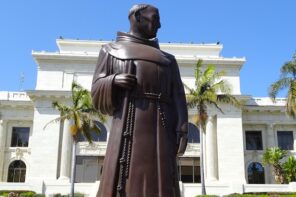Ted Cruz did his best to win over the evangelical vote by kicking off his presidential campaign at Liberty University, apparently hoping to channel the ghost of evangelical kingmaker Jerry Falwell. Although the jury is still out on how successful that effort will be, Cruz is also angling to win favor with another key conservative leadership constituency: the Catholic bishops.
Just days before announcing his presidential bid, Cruz and Oklahoma Senator James Lankford introduced two joint resolutions seeking to overturn a pair of local DC measures vigorously opposed by the US Conference of Catholic Bishops.
The Reproductive Health Non-Discrimination Act (RHNDA) would protect individuals from discrimination by their employers based on their reproductive health choices, while the Human Rights Amendment Act (HRAA) would repeal an exemption to the city’s anti-gay discrimination bill imposed by Congress allowing religiously affiliated schools and universities to discriminate on the basis of sexual orientation in terms of hiring and student organizations.
The bishops claim the RHNDA would force faith-based organizations “to support activity they deem morally objectionable, such as funding elective abortions through their employee health plans,” despite the fact that the DC Council clarified in early March that the measure doesn’t apply to health insurance coverage, only to employment discrimination.
They likewise object to the HRAA because they say it would force religiously affiliated schools “to endorse behavior contrary to their faith and moral convictions” and could require them to hire “an employee who has publicly denounced [their] mission.”
In a letter to Congress urging passage of Cruz’s resolution, the bishops claim the intent of the measures is to drive faith-based organizations, including the USCCB, whose multi-million dollar headquarters complex is in Washington, out of the District:
In effect, both RHNDA and HRAA would compel religious institutions, faith-based organizations, and pro-life advocacy organizations to engage in certain behavior that seems intended to drive these institutions and organizations out of the District of Columbia.
The bishops are casting the measures as an punitive assult on faith-based employers. But given the recent crackdown by Catholic dioceses on Catholic schoolteachers whose private lives are deemed in violation of Catholic moral teaching, it doesn’t seem farfetched that employees of religiously affiliated organizations would need this protection. While there have been no instances of religious employers being forced to hire someone who has “publicly denounced their mission,” there have been several recent of instances of employees being fired for going public with a same-sex relationship or unmarried pregnancy.
What the bishops are insisting on isn’t so much religious freedom as its been traditionally construed—freedom of worship and the right to hire and fire like-minded co-religionists in actual ministerial positions—but the right to use institutions tangentially related to the church to make cultural pronouncements about the moral unacceptability of non-procreative sex.
And the baseless charge about abortion coverage isn’t an accident. It’s no coincidence that the most successful religious liberty claims to date—Hobby Lobby, Little Sisters of the Poor—have involved baseless accusations about religious organizations being forced to cover abortion. Without this, the claims have much less resonance. To wit, there isn’t much sympathy for allowing religiously affiliated adoption agencies to refuse babies to LGBT couples or bakers to refuse to make cakes for same-sex weddings.
DC Council Member David Grosso, who introduced the measures, confirmed to me in an email that the charges about abortion coverage are baseless. “The Reproductive Health Non-Discrimination Act does not require any employer pay for anything. It only protects employees that go out on their own time with their own money to purchase reproductive health care.”
As for the idea that the measures were cooked up to drive faith-based groups out of the District or sideline the Catholic Church, he said, “The purpose of the bill is to protect an employee’s right to purchase reproductive health care without fear of being fired or discriminated against.”
That’s not to say that this issue isn’t extremely important to the bishops’ conference. The letter to Congress was signed by the usual religious liberty suspects, including Archbishop William Lori, head of the Religious Liberty Committee, and Archbishop Salvatore Cordileone, who is under fire for imposing a strict “morality clause” on teachers in San Francisco’s Catholic schools.
But in an indication of how the religious liberty issue crosses the political lines of the Francis papacy, the letter was also signed by two noted moderates: DC Archbishop Donald Wuerl, whose DC offices would fall under the law, and Boston Archbishop Sean O’Malley, who is considered Francis’ closest US ally. Of course, with Ted Cruz’s anti-immigrant language and disregard for the poor, it’s hard to see how Francis could approve of the bishops getting in bed with him, no matter what the issue.




